Man Gets Furious At His Wife For Taking A Dog Out To Pee Earlier Than They Had Previously Agreed
Dog lovers are fully aware of how their canine companions brighten their lives on an everyday basis. Along with being extremely adorable, enjoyable, and loving, they also never stop doing what they know best—making the world more cheerful and better.
Having a dog as a pet enriches and completes human life in many ways, but it also carries some responsibilities with it.
Having a dog is like having a child; you have to take care of it and do your best to make its life as happy as possible.
When you get a new dog, it naturally takes some time to adjust to each other's habits. But once you get it, you can't neglect its essential needs.
There are various types of training that you can do together to try to match your needs and manners as much as possible. However, when it comes to sleeping, napping, or simply needing the toilet, you can't tell your dog when it's time to address those physiological needs.
Recently, a Reddit user shared her story about her dog and its physiological needs. Her dog is an early riser and likes waking up at 5 a.m., so she agreed with her husband to ignore their dog until 6 a.m.
But this time, the situation was really urgent; the dog needed to pee and called her mom to take her out. So she had to break the agreement she had with her husband.
It's not a big deal, most of us would have thought. But her husband apparently didn't think so.
He got furious at her for not keeping the deal they had, even though she had explained how critical the situation was. So she wondered if he was overreacting or if she should have ignored their dog's cues and waited another hour to take her out.
Here's her concern and the whole story:

They adopted an early riser dog

They are still trying to balance their own needs with the dog's needs, and getting up early in the morning is one of them.
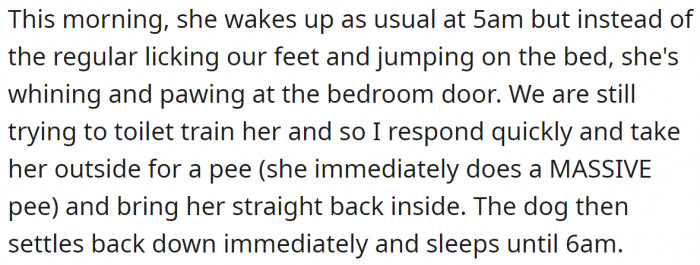
Understanding the Emotional Dynamics
Emotional responses in intimate partnerships can often be traced back to attachment styles formed during childhood. Dr. Judith B. Wallerstein, a psychologist known for her work on relationships, emphasizes that individuals who experience emotional insecurity may react with anger or frustration when they feel their agreements are undermined.
This situation highlights how perceived threats to one’s emotional safety can trigger defensive behaviors typical of insecure attachment styles.
Understanding Conflict Dynamics
Dr. Emily Chen, a social psychologist at Stanford University, emphasizes that interpersonal conflicts often stem from unmet expectations and miscommunications. Her research highlights how couples can fall into patterns of blame when one party perceives a violation of agreed-upon norms. This behavior can exacerbate feelings of resentment and frustration, leading to escalated arguments rather than constructive dialogue.
Moreover, understanding each partner's emotional triggers can foster a more empathetic perspective, allowing for a healthier resolution process. Couples therapy often includes strategies to clarify expectations and improve communication, ensuring both individuals feel heard and respected.
But physiological needs are not something one can ignore, or so the woman thought.

So she explained to her husband why she had broken their agreement, but he was still angry.
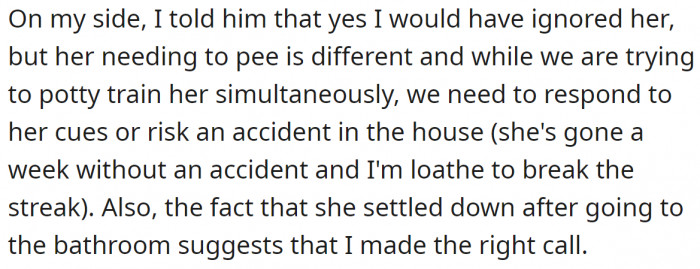
So she asked Redditors for an objective opinion.

Research published in the Journal of Personality and Social Psychology suggests that disagreements over seemingly trivial matters, like the timing of taking a dog out, often stem from deeper unresolved issues within the relationship. These conflicts can reveal underlying patterns of communication that are flawed, such as avoidance or blame, which ultimately hinder healthy dialogue.
Understanding this can provide couples with an opportunity to address and resolve core issues rather than getting caught up in surface-level disagreements.
A study published in the Journal of Personality and Social Psychology reveals that emotional responses to perceived betrayals in relationships can be intense and disproportionate. This phenomenon is rooted in attachment theory, which posits that individuals with insecure attachment styles are more likely to overreact to situations that threaten their sense of security. When the wife took the dog out earlier than agreed, it might have triggered feelings of abandonment or neglect in her husband, which he then projected as anger.
Recognizing these underlying triggers is crucial in resolving conflicts. Therapy can facilitate this understanding, helping both partners learn to communicate their feelings more effectively and reduce emotional reactivity.
It would have been cruel if she had waited an hour to take the dog out.

Some situations can't be controlled

It's true love

Practical Communication Strategies
To effectively navigate disagreements, it’s crucial to focus on open communication. A study from the University of Michigan highlights the importance of using 'I' statements instead of 'you' statements to express feelings without placing blame. For example, saying 'I feel hurt when our plans change unexpectedly' is more constructive than 'You never stick to our agreements.'
This approach encourages empathy and understanding, making it easier to reach a resolution together.
Strategies for Healthy Communication
To mitigate conflicts like this, experts suggest implementing regular check-ins about expectations and feelings. Dr. John Gottman, a renowned relationship researcher, advocates for these 'state of the union' discussions where couples can openly express their needs and feelings without judgment. Such practices can create a safe space for both partners to articulate concerns before they escalate into anger or resentment.
Additionally, utilizing 'I' statements can help reduce defensiveness. For example, instead of saying, 'You ignored our agreement,' a partner could express, 'I felt disregarded when the plan changed unexpectedly.' This approach emphasizes personal feelings rather than blaming the other person, paving the way for a more constructive conversation.
"It sounds like OP needs to renegotiate the agreement with hubby."
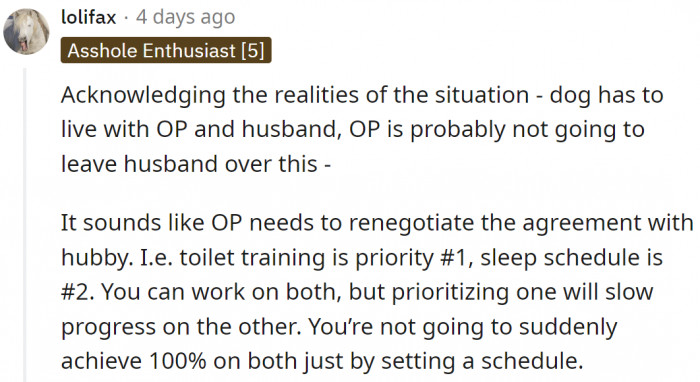
It's no one's fault; her husband should understand that.

Here is some helpful advice:
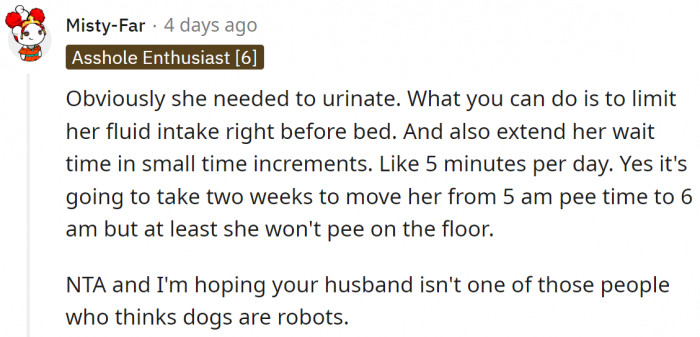
Furthermore, implementing regular check-ins about expectations can help prevent misunderstandings. Research indicates that couples who engage in ongoing conversations about their needs tend to have higher relationship satisfaction. Establishing a routine where both partners can voice their concerns or adjustments helps create an atmosphere of trust and respect.
These proactive measures can significantly reduce emotional volatility and foster a more supportive partnership.
It's essential to recognize the role of cognitive distortions in these arguments. Cognitive behavioral therapy (CBT) highlights how individuals can misinterpret their partner's intentions based on past experiences. When the husband reacted with anger, he may have been influenced by previous conflicts, leading him to assume the worst about his wife's motivations.
By challenging these cognitive distortions, individuals can gain a clearer perspective on their partner’s actions and intentions. Therapists often use techniques such as journaling or thought records to help clients identify and reframe these distorted thoughts.
This can help her also:
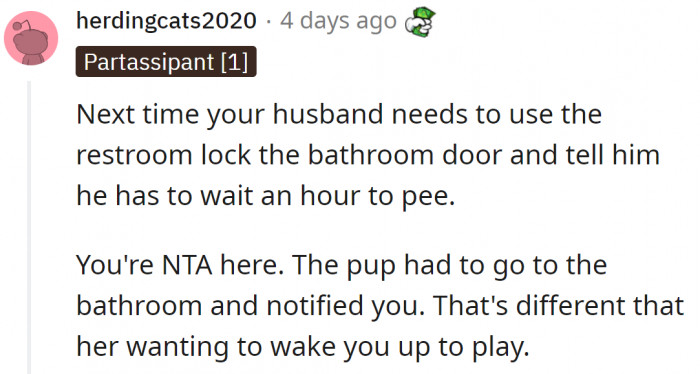
"You did the right thing."
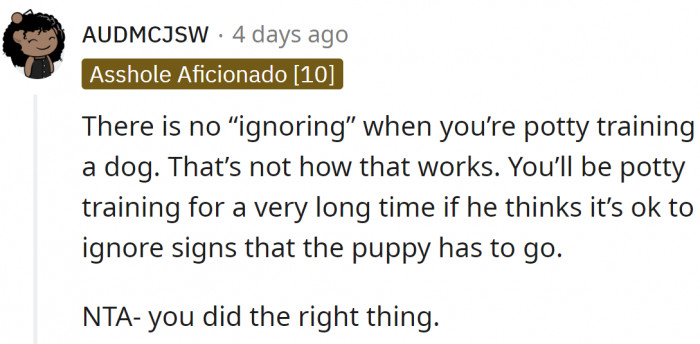
"Since doggo settled down after peeing, you made the right call."
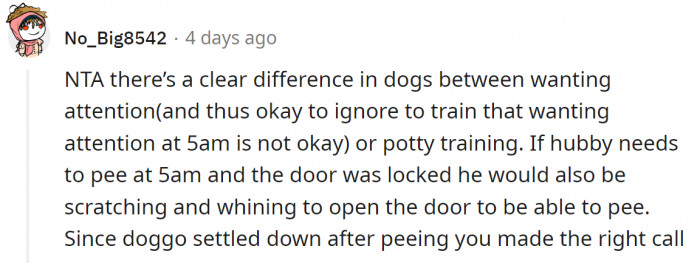
The Role of Emotional Regulation
Understanding emotional regulation is vital in managing intense feelings within relationships. A study by psychologists at Stanford University found that individuals who develop skills in emotional regulation can better cope with interpersonal stressors. Techniques such as mindfulness and cognitive reframing can help partners respond to each other with greater compassion and less reactivity.
By practicing these skills, individuals can learn to pause and reflect before reacting, which can lead to healthier interactions.
The Role of Emotional Regulation
Emotional regulation is a critical skill in navigating conflicts. Dr. Mark Brackett, director of the Yale Center for Emotional Intelligence, emphasizes that recognizing and naming one's emotions is the first step toward effective emotional regulation. When partners can identify their feelings of anger or hurt, they can better articulate these emotions constructively.
Practicing mindfulness and self-soothing techniques, such as deep breathing or taking a brief walk, can help partners manage their emotional responses before engaging in difficult conversations. This proactive approach allows for more rational discussions when tensions run high.
In that case, he would probably blame her again.
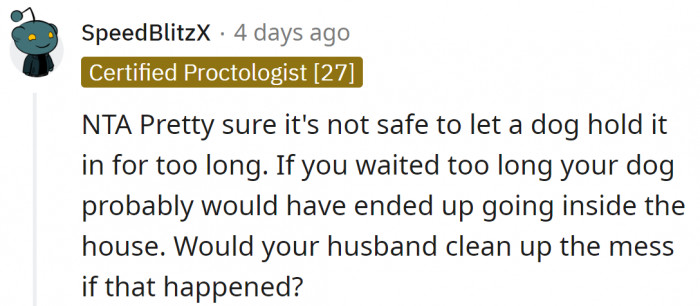
Exactly

If she needs to go, she needs to go—it's simple.
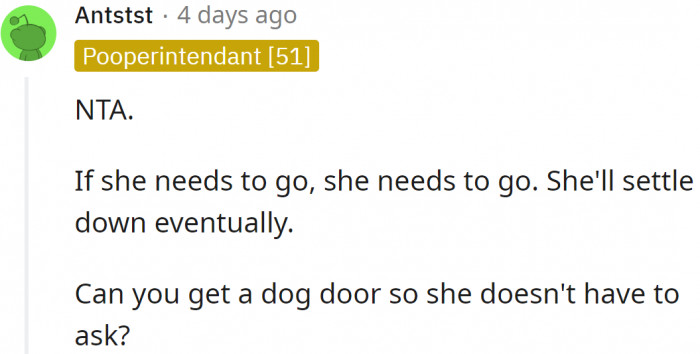
Ultimately, recognizing and addressing the origins of one’s emotional responses can lead to healthier relational dynamics. A clinical psychologist notes that therapy can be beneficial for couples who find themselves in repetitive cycles of conflict, helping them understand their emotional triggers and learn healthier ways to communicate.
This kind of therapeutic work can foster deeper emotional connections and a more resilient relationship.
Ultimately, this situation illustrates the importance of understanding relational dynamics and emotional triggers. Couples often find themselves repeating patterns of conflict stemming from unmet needs and miscommunication. By fostering open communication, practicing emotional regulation, and exploring underlying feelings, couples can break these cycles and build stronger connections.
Everyone agreed that she made the right call and took her dog out. But she also received some useful tips on how to help her husband understand the need for the toilet.
How would you handle this situation? And what would you do if your partner criticized you for understanding your dog's needs?
Psychological Analysis
This situation highlights how emotional responses can often overpower logical reasoning in conflicts. It's common for individuals to react defensively when they feel their expectations are violated, which can lead to misunderstandings. Addressing these patterns through open communication and emotional awareness can significantly improve relationship dynamics.
Analysis generated by AI
Analysis & Alternative Approaches
Research consistently supports the notion that effective communication and emotional understanding are vital in resolving interpersonal conflicts. As Dr. Terri Orbuch, a relationship researcher and author, states, "Healthy relationships are built on trust and open communication, allowing partners to navigate disagreements more effectively." By investing in relationship skills and emotional intelligence, couples can create a more harmonious and resilient partnership, as emphasized by Dr. Eli Finkel, who notes, "Understanding each other's emotions is key to maintaining a strong bond."
Analysis & Alternative Approaches
In summary, emotional responses in relationships often reflect deeper psychological issues rooted in attachment styles and past experiences. Addressing these patterns through open communication and emotional regulation strategies can significantly improve relational dynamics. As research indicates, couples who engage in proactive discussions about their needs and feelings tend to cultivate more satisfying partnerships.



